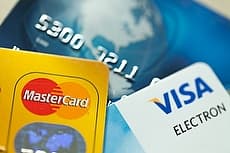Money-saving news, offers and need to know changes

26 October 2022
Cost of living showing worrying trends in affordability
29 June 2022
APP fraud and mobile banking fraud increased in 2021
16 June 2022
FCA warn lenders on cost of living difficultiesHow to find the best credit card deal
Customers trying to compare credit cards are often faced with a bewildering number of cards and too much financial jargon to wade through. That means it takes them too long to find the right credit card for them - if they manage it at all.
At Choose, we aim to make this process easier. This page offers a simple and straightforward credit card comparison tool which will help you find the best credit card deals for your requirements and circumstances.
Our comparison tool covers the wider UK market of credit card deals and allows you to search and filter by specific criteria.
You can compare by offer type to find credit cards with balance transfers, introductory purchase offers, cashback, retail point or air mile rewards, or even to help with building or rebuilding a credit rating.
Results can be filtered by bank or building society, allowing you to see the offers from providers you're familiar with, or just look for the best offer available for your needs.
With our credit card comparison service, customers have access to the best credit card deals in the market. However, we don't currently list student credit card deals, affinity cards or premium accounts requiring an income greater than £50,000 p.a.
Our credit card comparison tool delivers results from all banks, building societies and financial providers in the UK, including digital-only banks where relevant.
Choose frequently updates our credit card search results with the latest deals, meaning customers can be certain they're getting the most up-to-date credit card deals on the market.
If you click through any of the deals you find on the Choose website, we may receive a small referral fee. However, we're completely independent of all the companies we list and our search results are always ordered by price or feature and never by referral revenue.
As an added incentive to search for credit card deals via Choose, you might be interested to know that we give 5% of all our profits straight to charity. Learn more about our charity partnership for this year here.
How should I choose a credit card deal?
The first question to ask before you compare credit cards is the purpose of the credit card. For instance, are you trying to access balance transfer deals or are you looking for the lowest interest rates on an ongoing basis?
Different credit card offers are suitable for each different purpose, so decide which of the options best applies to you and tailor your search via that criteria when you compare credit cards with Choose.
If you're looking to repay existing debts, balance transfer deals are the best option. For more details on how these work, visit our dedicated guide on the subject.
Equally, for customers looking to buy a large purchase on credit, cards with a 0% purchases period are attractive because they allow borrowers to pay off as much of the debt as possible before the interest rate kicks in. Learn more here.
Customers hoping to use their new credit card for ongoing spending might be interest in low interest rates or other incentives such as air miles or shop card rewards.
There are even credit cards on the market which are specifically designed to help customers rebuild or strengthen a poor credit history, or to help new customers with no credit history develop one.
Once you've decided what the purpose of your new credit card is going to be, the next elements to consider are the cost and which card deals offer the cheapest and most sustainable borrowing options.
How do I apply online for a credit card?
Applying online for any of the credit cards you find on the Choose website is usually straightforward but remember that many credit card providers will undertake a full credit check when the application is made.
If the application is then rejected by the lender, this leaves a mark on your credit history for three months and multiple rejections like these can impact your chances of getting credit in the future, so be careful which cards you apply for and don't apply for many in quick succession.
Some providers offer pre-application checks which allow you to see if you're likely to be accepted and these don't leave a footprint on your record. If you're uncertain, it might be useful to opt for one of these providers.
One of the most common reasons for a credit card application being rejected is that the applicant simply doesn't conform to the eligibility criteria set by the lender. Some cards have stricter guidelines than simply age and income, so read them carefully.
Adding to the problem, however, is that some lenders don't publicise the criteria their internal systems are working from. This can make it difficult to understand why you might have been rejected for a specific credit card.
The time it takes for a decision to be made and subsequently for a new credit card to be issued depends on the provider, but many decisions are now subject to computer checks rather than manual checks which may bring the wait down from 14 days to 10 days. Learn more here.
Remember to check when you compare credit cards whether there are any requirements to taking the card such as moving an existing balance to the new card within a certain time frame.
Do credit cards offer extra protection for purchases?
One reason some people opt to keep a credit card in their wallet is due to the extra protection they can give customers in comparison to cash or debit cards.
Section 75 is part of the Consumer Credit Act 1974 and means that a credit card provider has a responsibility to help if a cardholder has a claim against a company under relevant legislation. This can occur because retailers and lenders are deemed to be equally liable for the delivery of goods.
Cardholders can claim on items that aren't delivered, are faulty or are damaged by the time they receive them, and purchases between £100 and £30,000 are covered.
It's worth noting, however, that customers may need to be persistent to get the protection they're entitled to, so be sure of your rights before you approach your lender. Learn more about Section 75 here.
Chargeback is a similar, albeit weaker, form of protection which applies to both credit and debit cards. It essentially allows card holders to reverse transactions where consumer protections have been breached. Find out more about chargeback in our dedicated guide.
Purchase protection insurance is also offered by some credit card providers to protect against loss, theft and damage for certain items or services purchased with the card for up to three months after the date of purchase.
However, purchase protection insurance may not be any better than the protections you legally have.
When do I repay purchases I've made with a credit card?
A statement balance will be provided monthly by your lender, with details of the time period in which the payment must either be made in full or a minimum repayment must be made.
The general rule is that cardholders should pay as much from their balance as possible every month to avoid building up any debt. Wherever possible, repay the full amount.
Once they are aware of the credit card's minimum monthly repayment, many customers set up a direct debit for that amount or more to ensure they don't miss a monthly payment.
This is especially crucial if you've opted for one of the balance transfer deals available on the market, as balance transfers can be withdrawn if the cardholder breaches certain conditions such as failing to make the minimum repayment or exceeding their credit limit.
If a balance transfer deal is withdrawn due to breaches, it's gone for good and interest will therefore be payable the next month and beyond. So, keeping track of your minimum repayments is vital to avoid accidentally breaching your contract.
For customers using credit cards to help build up a good credit rating, paying your bills on time is an important element of ensuring you develop an effective credit history so make sure that you prioritise your payments.
How much will I be charged for using a credit card?
When you compare credit cards, one of your primary questions should be how much it will cost in terms of interest and fees.
The APR of a credit card is the annual percentage rate of the card, meaning that the percentage is what customers will be charged in interest over a 12-month period. To take an example, 24% APR would mean monthly interest of 2%.
However, when you compare credit cards, you'll see providers offering a "representative APR". This means that the figure they're showing you is the interest rate which at least 51% of their customers obtain.
This doesn't mean that it's the rate that will be applied to your credit card, though, and it could be higher or even lower depending on your circumstances and your credit profile. So, it's crucial to be sure of the APR offered to you before you use the card.
Credit cards offer an interest free period, generally of around 56 days. If you make a full repayment during this window, you'll avoid interest charges - but only on purchases.
Customers opting for introductory offers including 0% on purchases should be aware that this doesn't apply to any cash withdrawals made using the card. This means that they will still be liable for interest and withdrawal fees.
New rules came into force in 2018 banning retailers from charging an extra fee for paying with a credit or debit card. This rule helps customers to know exactly what will be appearing on their bills, and customers can complain to Trading Standards if these regulations aren't observed by companies.
Do I need a good credit history to be accepted?
A credit history which is incompatible with the criteria the card provider is working to is a common reason why some applications are rejected. However, this doesn't mean your hopes of getting a credit card are minimal.
An issue with many balance transfer deals is that they do require applicants to have a good credit history to be accepted. This seems strange considering the purpose of balance transfer is to help customers move from high interest deals to more manageable credit.
It's also possible for many people to get a credit card that is designed to help customers rebuild a poor credit rating. Simply filter the search options at the top of this page to show only the cards for building or rebuilding a credit rating.
Bear in mind that the APR on these cards are likely to be high, so repaying the full amount of your spending each month will ensure you don't fall into debt and will help to build your credit rating effectively. These cards are less likely to have introductory offers attached, but there are exceptions.
Will I be accepted for a credit card?
Basic eligibility criteria for accessing credit cards is that an applicant must be over 18 and be a UK resident. Other eligibility criteria will depend on the provider and what they're looking for.
For instance, the checks that credit card providers undertake include examining how many times you may have changed addresses in recent years. If you seem to live an unstable lifestyle, this may affect your chances.
Equally, when you compare credit cards, remember to be honest about your employment details and finances. Having all these details set out before you even apply will help you determine whether you'll be accepted when you compare what minimum salary they want with your own.
As mentioned above, your credit history is important, and this is something that providers will check thoroughly to see if it raises any red flags within their system.
It's worth noting that this doesn't just cover your past transactions and how effectively those were paid. Credit checks also examine the amount of credit customers already have available elsewhere and what type of borrowing behaviour they have exhibited in the past.
If you're uncertain about your credit history and the factors which play into it, obtain a copy of your credit report via one of the online credit score sites and see what might hold back your application.








